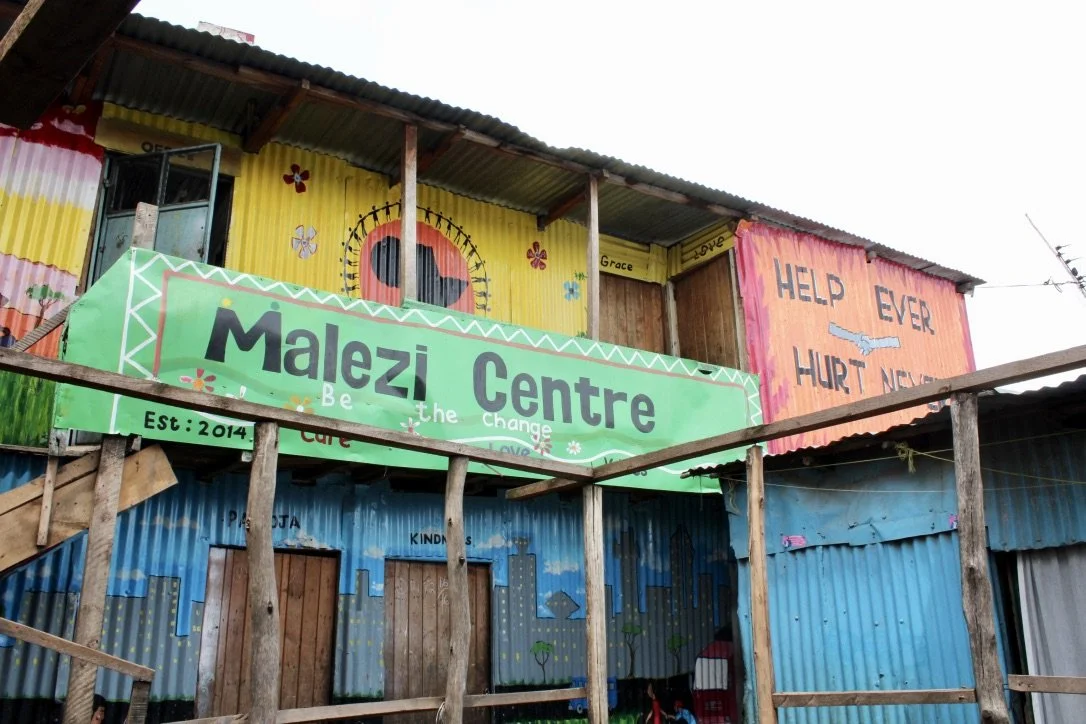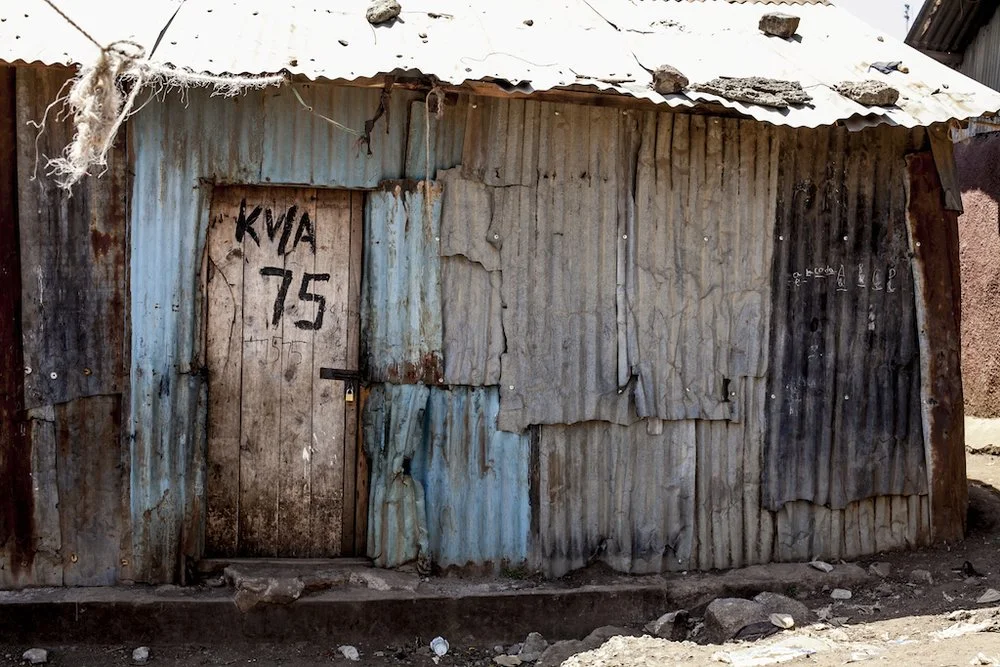Malezi Centre
A primary school and community center, creating change
in one of Nairobi's harshest slums.
KITUI NDOGO, located 15-minutes east of Nairobi's bustling city center, near the infamous Eastleigh district, is home to an estimated 50,000 residents, many of who survive on less than $2 USD/day. It sits opposite a middle-class housing complex and footsteps from the towering Masjid Noor — a mosque rumored to be a recruiting center for the Somali-based al-Shabaab militant group.
A highly polluted Nairobi river, doubling as a human waste dump site, flows through a densely populated maze of crudely constructed, dilapidated structures mostly fashioned out of corrugated iron sheets and mud.
Nairobi river flows through Kitui Ndogo.
Life is harsh in Kitui. Due to the prevalence of extreme poverty, the area is plagued by crime, violence, and prostitution, as well as drug and alcohol abuse.
Compared to the famous Kibera slum, where thousands of NGO work, less than a handful work in Kitui due to its hazardous sanitation problems, security issues, and its relatively small size. It is likewise not given full attention by the local government administration, which neither the resources nor willpower to address the numerous complex challenges facing the residents of this community.
What can be done?
This question is best answered through the story of Kitui Ndogo community organizer Teacher Grace Kavoi.
Historically, children growing up in Kitui have not been able to go to school, as even low-cost public schools require fees that are out of reach for those in poverty. Since the majority of Kitui parents can't afford public or private school fees and often haven't been educated themselves (and, understandably, don't fully grasp the value of an education), kids will just sit outside all day unattended. Their all too likely fate is to succumb to the negative influence of the environment and repeat the cycle of poverty.
In 1998, following an inner call to be of service to these vulnerable youth, Teacher Grace decided to offer a donation-based daycare program in her one-room shanty, with the idea to lovingly teach the basics of education to any child who wished to come and learn.
She began with two students. Word then quickly spread about her sincere love and enthusiasm and more and more students enrolled. She eventually rented a dedicated space, aptly named Malezi (“to nurture”). As more time passed, Grace’s daycare experiment evolved into a fledgling primary school, where she and one other teacher taught the official Kenyan curriculum and abided by the norms of the academic school year.
True to her name, the stories of impact and change Teacher Grace is responsible for, are too many to count.
She has inspired many of her students to pursue their education and some have even attended university. More than that, she teaches the importance of a moral, responsible life and has profoundly altered the course of lives for the better — creating a number of community volunteers and change agents who are following in her footsteps.
Malezi Centre 1.0
Continued growth
Inspired? Get Involved!
The story of Malezi is an example of how the cycle of poverty can be disrupted from the inside-out. Education is one part of it and also, importantly, love, dedication, and pure service.
For the latest news and updates about the school, you can subscribe to our newsletter below.
If you are interested in financially supporting Malezi, click the give button below. Or, be in touch to discuss other ways to get involved, such as volunteering if you happen to be in Nairobi.
What can be done? People can care, even when it’s hard to do so. In faith, they can give great service from the heart and work hard to further a cause without regard to their own immediate needs (all these years, Grace has never subsisted on more than $100/month, and much less than that at times).
Through this, change, even in the most desperate of circumstances, can come. That is the story of the Malezi Centre and why it continues to grow in remarkable ways.
Malezi x Mahtabe
By 2012, Grace’s school — a 10’x10’ room with no windows or electricity — reached capacity with 60 students of mixed ages and class levels.
Through a local NGO, Malezi was introduced to Mahtabe to plan the construction of a structure with enough space to comfortably seat 200 students across all the primary school grades. On Christmas Eve of the same year, the local team broke ground, which signaled the start of construction and a new chapter for Malezi, its students, and residents of Kitui Ndogo.
Malezi Centre 2.0
Malezi 2.0 was officially inaugurated on 28 January 2014 in the presence of parents, students, community members and leaders, as well as representatives from the local government administration.
In a little over three years, the school grew exponentially, winding up with a whopping 225 students and 9 teachers. It received official certification as a Complementary School, which enabled Malezi to administer the primary school exam (KCPE) and graduate Class 8 students.
Due to overcrowding and continued enrollment demand, the building was expanded late in 2017, with the support of Mahtabe, by adding four new classrooms, including a computer lab and library.
Malezi Centre 3.0
During a site visit in May of 2018, it was clear that Malezi had, once again, outgrown its space. By this time, Kitui Ndogo was beginning to receive legal recognition from the government, entitling land owners to title deeds, which put a stop to the random demolitions residents were accustomed to.
In light of this, and somewhat presciently, it was decided to reconstruct the school from the ground up as a brick and mortar building to “cement” its standing in the community and fully accommodate its needs. About a year later, the collapse of another (poorly constructed) complimentary school forced the Ministry of Education to require all such schools to become brick and mortar-based or be forced to permanently close.
Thankfully, fundraising for Malezi 3.0 was nearly complete, construction was underway, and all funds were on hand shortly before Christmas of 2018. Owing to a stellar effort of non-stop work, the new building — standing three stories tall, with 15 rooms, as well as an open air rooftop with sweeping views of Nairobi — was fortuitously raised days before the global 2020 Covid Lockdown. You can view the construction photos here.
Meals Program
Hunger is a persistent challenge in Kitui Ndogo and among Malezi’s students, where most come from families who meet the World Bank’s definition of extreme poverty. It is not uncommon for them to eat only one meal per deal or go several days without eating when money dries up at home. As a result, the school has faced attendance issues, poor engagement in the classroom, and poor exam performance — not to mention a few medical emergencies.
It was clear since Malezi 2.0 that offering meals to the student body and faculty would be essential, as chronically hungry and malnourished students are unfit to learn. It’s just that this dream always seemed out of reach due to the relatively expensive undertaking of providing regular meals to over two hundred students, with no way to cover the cost through increased school fees.
Teacher Grace Kavoi
In 2018, The Pema Chödrön Foundation graciously began supporting the annual cost of a meals program, which included a daily vegetarian lunch, light breakfast of millet porridge, and afternoon tea and snacks for the teachers.
Immediately after, Malezi witnessed radical changes. Class attendance, engagement, and exam performance all improved dramatically. Morale across the entire school improved and Malezi’s reputation and credibility in the community boosted.
With 80,000 meals served each year now, student hunger and malnutrition is a thing of the past. You can watch a short documentary on YouTube about this incredible program here.






